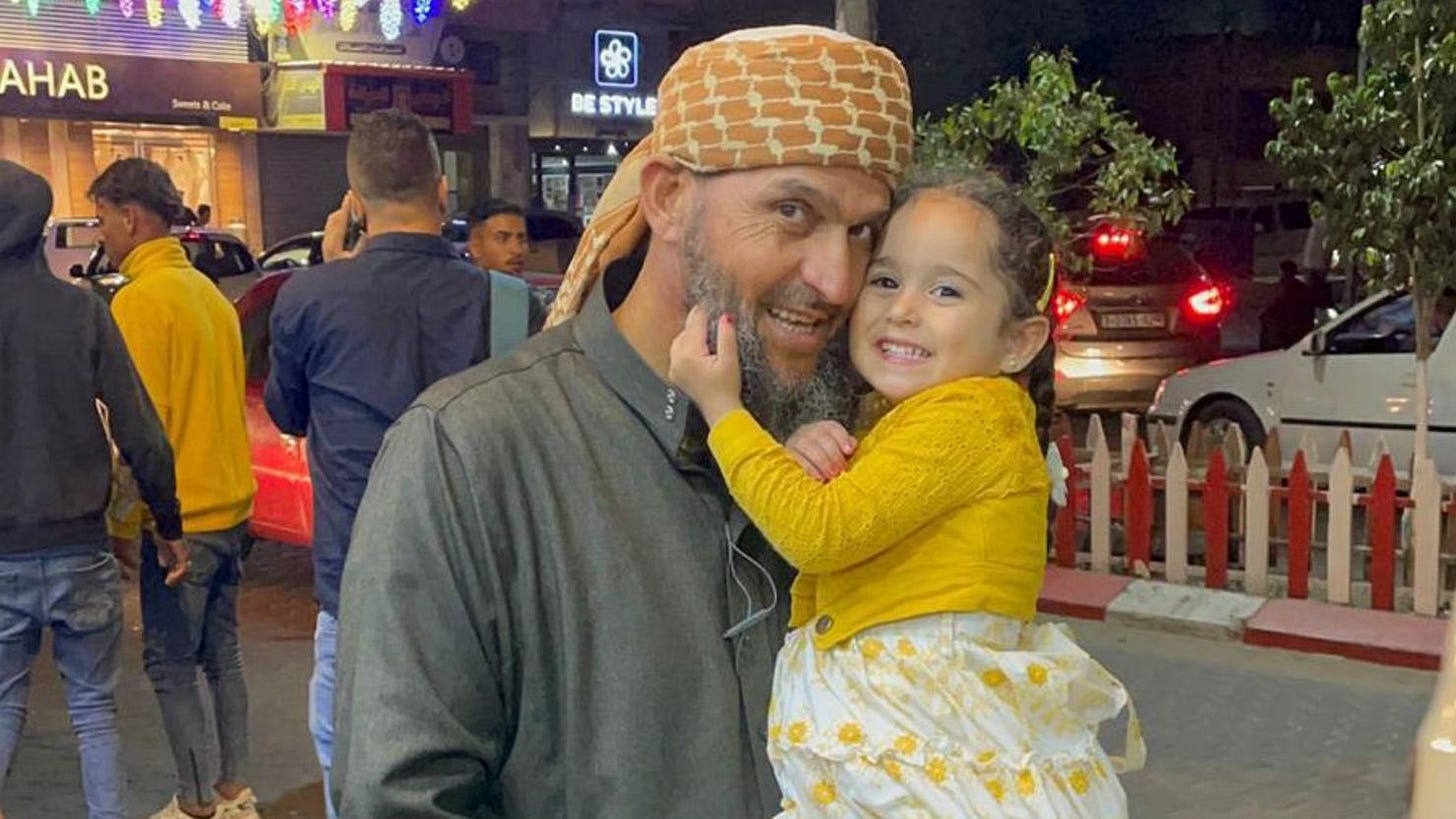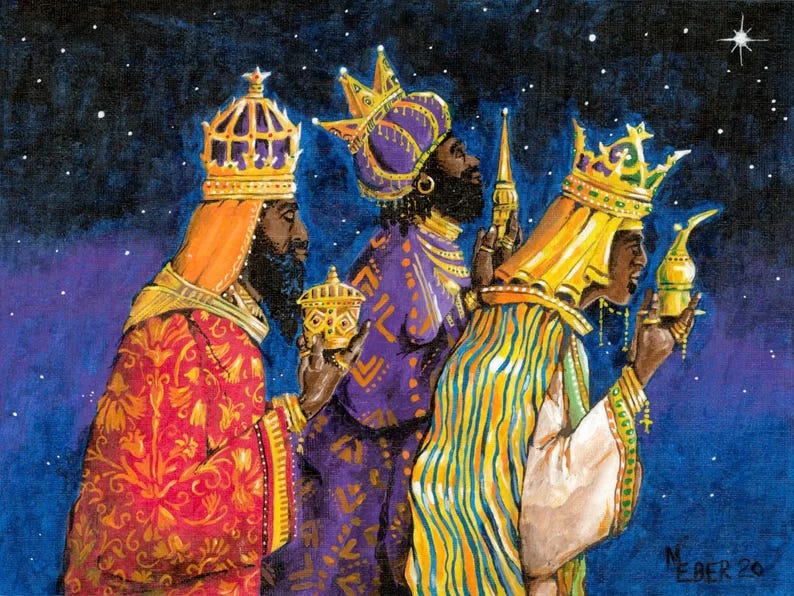The birth stories of Jesus vary between the Gospels. While Luke’s Jesus is visited by lowly shepherds, emphasizing that Jesus came for people on the bottom rung of society, Matthew has him visited by wise men– Magi from a distant land, emphasizing that Jesus came to bring God’s blessing to all nations (Matthew 28:19). Neither God nor Jesus is owned by any single religion or culture; he is the universal Christ.
Matthew 2:2-12
The Magi Visit the Messiah
2 After Jesus was born in Bethlehem in Judea, during the time of King Herod, Magi from the east came to Jerusalem 2 and asked, “Where is the one who has been born king of the Jews? We saw his star when it rose and have come to worship him.”
3 When King Herod heard this he was disturbed, and all Jerusalem with him. 4 When he had called together all the people’s chief priests and teachers of the law, he asked them where the Messiah was to be born. 5 “In Bethlehem in Judea,” they replied, “for this is what the prophet has written:
6 “‘But you, Bethlehem, in the land of Judah, are by no means least among the rulers of Judah; for out of you will come a ruler who will shepherd my people Israel.’”
7 Then Herod called the Magi secretly and found out from them the exact time the star had appeared. 8 He sent them to Bethlehem and said, “Go and search carefully for the child. As soon as you find him, report to me, so that I too may go and worship him.”
9 After they had heard the king, they went on their way, and the star they had seen when it rose went ahead of them until it stopped over the place where the child was. 10 When they saw the star, they were overjoyed. 11 On coming to the house, they saw the child with his mother Mary, and they bowed down and worshiped him. Then they opened their treasures and presented him with gifts of gold, frankincense and myrrh. 12 And having been warned in a dream not to go back to Herod, they returned to their country by another route.
According to the overwhelming consensus of scholarship, this beautiful story is mythical, which means that it is true, but it never happened. I do not believe Matthew was lying. He does not intend his readers to research historical star patterns, or find the descendents of the magi to find out what baby Jesus was really like. A myth is a true story, not because it happened, but because it is always happening. Like the parables Jesus told, this story teaches us about what God is like, and what we are like, and where God is to be found.
At the risk of sounding obvious, the Magi were not Christians! In fact, for Matthew’s Jewish listeners, these fictional characters would have seemed a lot like the Babylonian “magicians, enchanters, sorcerers and astrologers” (Daniel 2:2) who opposed God’s people. These were “pagan” astrologers, but Matthew shows us that they were alive to the God of creation. They saw God in the stars, for “the heavens declare the glory of God!” Their worship of Jesus is honored, and they are esteemed as wise and holy people, even though they never repent or convert to serve Israel's God.
This ancient story of stargazing seekers feels particularly relevant today, as astrology is experiencing a surge in popularity. When I hit the dating scene after my divorce, I quickly learned that I needed to know my star chart in order to navigate the questions I would receive on first dates In case you’re curious, I’m Capricorn sun, Aries moon, Aquarius rising, and my Venus is in Sagittarius— I’m not particularly sure what much of this means, because like many Christians, I was told to stay away from astrology, because it could lead me away from God. And yet, the stars led the Magi to Christ! If we believe that creation is not random or chaotic, but rather designed by God and enchanted with divine love, then why shouldn’t the skies be filled with meaning? We should not quickly write off a spiritual path, simply because it is different from our own, or comes from a foreign culture. What if instead, we received gifts of wisdom from other traditions and cultures, as Jesus received his gifts from the Magi?
Many of us were taught to despise any religious practice that did not have Eurocentric, Western, Christian origins. Growing up, I was taught that tarot cards were witchcraft, yoga poses were demon worship, and Eastern meditation practices could let in evil spirits. At a fundamentalist summer camp I was told that rock and roll was inherently evil because the syncopated rhythms came from African tribal music. This mindset, a toxic mixture of white supremacy and Christian supremacy, has caused unimaginable global suffering, justifying colonialism and genocide. As D. Danyelle Thomas powerfully reminds us, “For Black folks (and, I imagine, other people of the global majority), convincing us to recognize our inherited spiritual practices as demonic is the greatest trick white supremacy has ever pulled on us.”
Many of my friends have found incredible spiritual value in reconnecting with their ancestral religious practices. For example, my friend Keri has rediscovered the spiritual value of her Indigenous roots. Similarly, many Black Christians have found spiritual power in incorporating traditional African understandings of ancestors into their spirituality. Rituals of remembrance of ancestors are an act of defiance against the colonizing mindset, which worked to wipe out African identity. Reclaiming these practices reminds Indigenous and Black people that their roots are not demonic. It was the superiority, othering, and violence of colonial white supremacy that was truly demonic. Their cultural background is “very good” (Genesis 1:31) and beloved by God. Like the gifts of the Magi, spiritual practices from other traditions are gifts that can enrich our connection to the divine.
It was very subversive for Matthew to begin his story this way. These “heathen” foreigners would have been sneered at by many religious Israelites, as they would also be demonized by many Christians today. Dogmatic, “us vs. them” thinking is common to humanity, but here we see how the story of Jesus is meant to break down those old patterns, and help us see ourselves as a part of one human family. Matthew is teaching us through the Magi that the reality of God revealed in Jesus is universal; not beholden to one nation, people, or even religion.
Far from seeing the Magi as in need of repentance or conversion, Matthew’s gospel emphasizes their wisdom. We can learn so much from them.
The great wisdom of the Magi is that they left the comfort of their world and culture, traveled into a foreign and hostile world, and knelt before a child. They did not limit the possibilities of where God could show up to their own nation, culture, or religion. With eyes of faith, they saw the divine Christ in the human baby Jesus (We see this same wisdom in the Roman centurion– a Gentile who is drawn to the divine presence he encounters in Jesus, though Jesus was a foreigner to him). The Magi saw God in a child from another culture, and believed that this baby was deserving of gifts fit for a king.
What if it’s true that every child is deserving of such gifts? What if we treated children from every nation as if they were worthy of gold, frankincense, and myrrh? What if we saw a star hovering over every child in the ruins of Gaza? Khaled Nabhan, a Palestinian man who lost his precious 3-year-old granddaughter Reem, went viral in a widely shared video of him cradling Reem’s lifeless body, and kissing her eyes. Over and over again he called her “the soul of my soul.” But every child is the soul of someone’s soul. Even an orphan is the soul of God’s own soul, for God is the “Father to the fatherless” (Psalm 68:5). James Baldwin said, “The children are always ours, every single one of them, all over the globe.” We are so quick to limit deserving-ness to our own kind.

The Magi’s story also has a villain– king Herod, who believes that he alone is “king of the Jews,” and so he misses the beauty of the Christ, right in his own backyard. While the Magi worship a God from another land, Herod is blind to the Savior of his own nation. But “God is not far from any of us (Acts 17:27).” God makes Herself easy to find. We can look in the skies. We can gaze at a child. It has less to do with where we look, and more to do with our capacity for seeing.
There is a Herod in all of us, that resists the pull to see God in others, or outside of our enclosed worlds. We believe that God is to be found in my country, my culture, and for people like me. The Gospel of Matthew will instead teach us to see Christ everywhere, and most especially in “the least of these.” For when we give the thirsty a drink, invite in a stranger, clothe the naked, or visit the imprisoned, we are giving gifts to a divine person of inestimable worth; the soul of God’s soul. When we kneel before any child, we kneel before a king.
For this breath prayer, where do you see yourself? Are you the child, receiving gifts from a cultural “other?” Or are you the Magi, kneeling before a foreign child, seeing the divine light in this lowly infant?
Inhale: The heavens declare the glory of GOD. (4 seconds)
-HOLD- (4 seconds)
Exhale: May I have eyes to see. (4 seconds)
Inhale: Every stranger (child/person/creature) is holy. (4 seconds)
-HOLD- (4 seconds)
Exhale: May I have eyes to see. (4 seconds)







Profound share per usual Brian… Thank you for detailing and for the connection to the Gazan grandfather who touched so many of us.
Yogananda considered the magi to be Indian rishis as Matthew 2 specifies they came “from the East”… Vedic astrology is of course superbly advanced and the modern master makes the case that they were coming to honor earth’s latest Avatāra. Adds up! ❤️🔥🕉️
Thank you so very much for this. What a gift this is. 💫